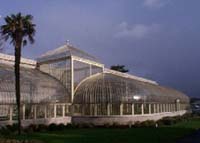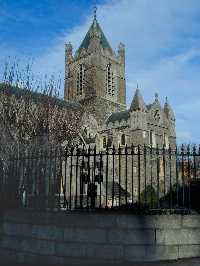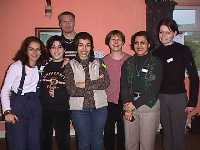The National Botanic Gardens
Although the principal
object of botanic gardens is to maintain collections of plant species for
the purpose of study, many can be pleasant and instructive places
to visit. The National Botanic Gardens at Glasnevin Ireland's premier
botanical and horticultural establishment, is a rewarding and attractive
garden for gar deners and non-gardeners alike. Occupying a beautiful
forty-eight acre site on the banks of the Tolka River it contains over
20,000 different plant species and cultivars including many exceptional
specimens. There are some lovely trees, many outstanding displays of
shrubs and perennials, a great selection of plants of the rhododendron
family and, of course, the famous glasshouses, including Turner's magnificent
curvilinear range. These buildings have long been a great attraction of
Glasnevin, especially the curvilinear range which was commissioned by David
Moore in the 1840s and is now in the process of being restored. The
central pavilion and one wing of this range was built by Richard Turner,
the Dublin-born ironmaster, and completed in 1848. Twenty years later
Turner ingeniously doubled the building in size by removing the walls
and extending it back. The Great Palm House containing the tropical tree
collection and notable now for its cycads was built in 1884, while its
side wings, housing orchids and flowering pot plants, belong to an earlier
building.
by Thomas Berger


Christ Church Cathedral
A real treat is the Christ
Church Cathedral of Dublin which was near our hostel, Kinley House . It
seemed to be a clearly identifiable sign of Godís goodwill that suddenly
the sun came out on this otherwise so windy and rainy day. The cathedral,
which was built in the year 1030, briefly became a cathedral priory under
the Benedictines at the end of the eleventh century . Inside the ancient
halls we could discover statues of Charles the first and Charles the second
and a spectacular organ . In the churchís history some parts had been destroyed
or damaged, so that some major restorations were necessary over the centuries.
Some visitors expressed
surprise at being asked to give a donation on entering the church. However,
in Ireland churches do not receive any financial help from either national
or local government.
Our pilgrimage was successful
and we were able to make a lot of beautiful photos to take home.
by Marc-Michael Fuchs
The home trip to Brighton
The home ward journey from Dublin to Brighton was hard as we were just all very tired from having experienced the Irish hospitality!Once in England we were greeted
with weather similar to the sort we had had in Achill, grey skies, rain
however less wind and not so cold. Laura was met at Gatwick airport, the
rest of us took the coach back to Brighton. This marked the end of our
trip and months of planning. We returned tired but with lots of memories.
by Helen Silk.


Dr. Laurent Borgmann
Last modified by: Marc-Michael Fuchs